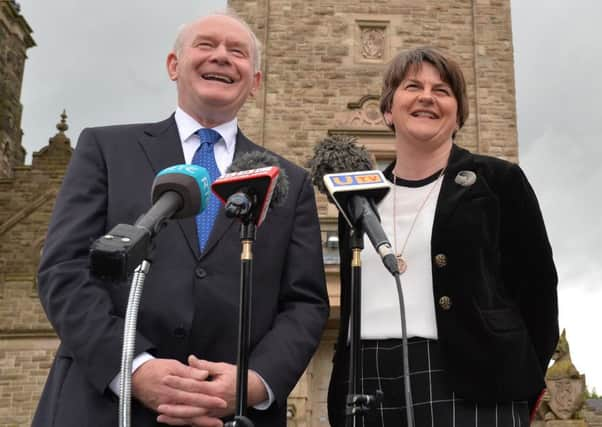Key Foster-McGuinness Brexit letter was actually written by civil servants


In August 2016 the then first and deputy first ministers wrote to the prime minister to set out their agreed priorities for the Brexit process.
Arlene Foster and Martin McGuinness’s letter was presented as a significant development and has since been cited by those who defend the previous Stormont regime as an example of how opposing sides could pragmatically agree to work together.
Advertisement
Hide AdAdvertisement
Hide AdHowever, material released under the Freedom of Information Act shows no evidence that Mrs Foster, Mr McGuinness or any of their political advisors played any role in the letter beyond requesting it at a meeting which was not minuted and then the ministers putting their signatures to the letter.
Given the culture of verbal government within Stormont where certain communications were deliberately not written down to avoid the public ever getting to see what went on, it is possible that either the ministers or their special advisors (spads) were more involved but did not want that to be known.
However, the material released suggests that three senior civil servants were responsible for the overwhelming bulk of the letter.
The letter called for an open Irish border, the retention “as far as possible” of the current ease of cross-border trade, access to EU labour, consideration of the energy market and the preservation of farming subsidies and EU Peace funds.
Advertisement
Hide AdAdvertisement
Hide AdThe first written mention of the letter came in a memo from the then head of the civil service, Sir Malcolm McKibbin, to Andrew McCormick, permanent secretary of the Department for the Economy, and David Sterling, permanent secretary of the Department of Finance.
The brief August 3 2016 memo was titled ‘meeting with DUP/SF representatives’ and said: “I had a meeting with Timothy Johnston and Aidan McAteer at which it was agreed that: Officials would prepare a letter from FM/dFM to the Prime Minister articulating the priorities that are emerging from the scoping exercise we are carrying out on the implementations of leaving the EU.”
Mr Johnston was the most senior DUP spad and is now the DUP’s chief executive. Mr McAteer was barred by law from acting as a spad because of a serious criminal conviction. However, Sinn Fein circumvented the law by making him a ‘super spad’, putting him over the party’s team of spads and ministers – something which civil servants agreed to, even though it was against the spirit of the law.
Stormont Castle has not acknowledged the existence of minutes of the meeting between Sir Malcolm and the DUP and Sinn Fein spads, suggesting that no minutes of the meeting were taken. The following morning, Sir Malcolm emailed his two senior civil service colleagues with a draft of the letter which he had drawn up and asked them for any comments by lunch time.
Advertisement
Hide AdAdvertisement
Hide AdThree hours later Dr McCormick replied to say that he had discussed the issue with Mr Sterling and they had agreed a series of changes to the text. Mr Sterling felt it contained a section on agriculture which was “too long”, something which “unbalances the overall thrust of the letter”.
Five days later the amended letter was sent to the private secretaries of the first minister and the deputy first minister. Not a word of that letter was changed by the ministers or their spads before it was sent to Downing Street the following day.